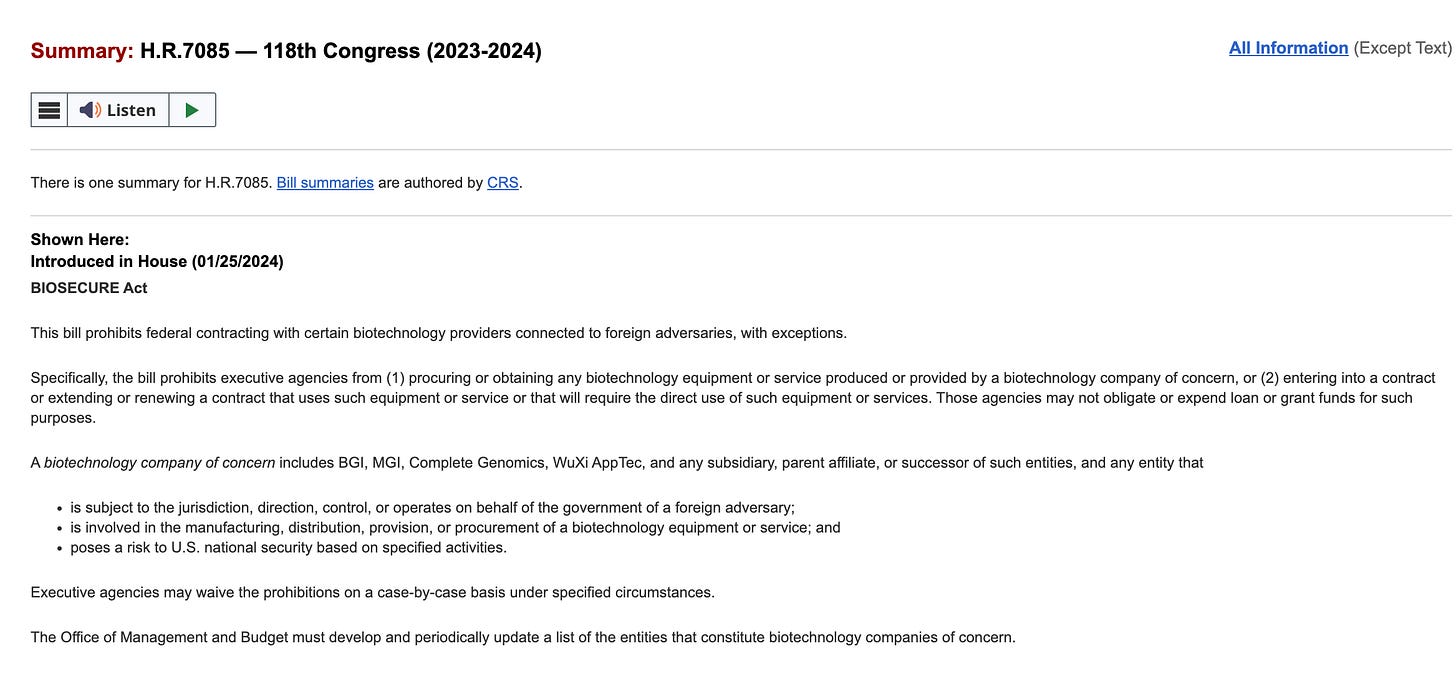Red Scare Revival
on biosecurity, not the podcast
It’s Cinco de Mayo! Famously not celebrated in France because they lost the Battle of Puebla. We have back-to-back letters this weekend, see why in the previous note. Today we cover the new red scare and what it could mean for drug dealers (developers)! This is a big pharma safe space.
Who are the biggest frenemies right now? Not K Dot and Audrey—US and China. It’s a complicated, co-dependent relationship. Think economic benefits/trade, foreign policy, environmental goals, science + technology. Iykyk, but I’ll do my best to break it down if you don’t. (Please note that I focused on biology and comparative politics in undergrad, NOT international relations. This is not my area of expertise.)
Both countries are main characters
In a Brookings Institute written debate, Graham T. Allison posits that China is “both a classic Thucydidesan rival and America’s inseparable, conjoined Siamese twin.” If it’s been a while since you studied Ancient Greece (makes sense!): the Thucydides Trap is a term he’s coined to describe the tendency towards war when an emerging power threatens a hegemonic power. Like in the Peloponnesian War between Athens + Sparta, because that’s what happens when men feel insecure…I guess? It’s often used to describe US-China relations, but scholars contest whether this is the appropriate application.
Both countries have made moves to de-risk their economies
To illustrate, China is supporting global partnerships to reduce US dollar reliance on foreign deals in favor of local currencies. The US has also de-emphasized its trade relations with China. Instead, adopting near-shoring/re-shoring tactics and cultivating stronger relationships with other allies. I wonder which therapist advised them.
Washington imposed advanced chip technology sanctions on China, for example, to limit China's access to cutting-edge semiconductor technology. It didn’t quite work, instead launching a mini tech Cold War as China aimed to develop its own semiconductor market. The US is now upping the ante by asking allies to also cut their chip exports to China. Beijing wants the US to drop these sanctions, but they also want the US to cool it on Taiwan and look beyond their human rights violations. The US is like, “Maybe stop exporting fentanyl to Latin America, because it’s killing us. But also…we wouldn’t be so preoccupied about Taiwan if you’d quit it with the fucking military bases in the South China Sea!” Or something like that, Idk. I wasn’t in the room. I am begging you to read this commentary on the current state of affairs by Patricia M. Kim. For your own good. She actually knows what she’s talking about.
The US has a history of side-eying China
Sometimes, they have reasons to be sus: Reuters reported in March that US Intelligence agencies briefed Congress that WuXi AppTec (Chinese biopharma R&D & manufacturing) shared US data/IP with the Chinese government without data owner (US biopharma client, presumably) consent. Both the firm and the Chinese government deny this. Regardless, this added fuel to the anti-China sentiment within the US government.
Enter: the BIOSECURE Act
Against the backdrop of growing distrust, she’s backed by bipartisan support, naturally.
The bill (remember, it’s not a law until it passes + the president signs it into law) aims to tackle perceived biosecurity threats by restricting US companies from engaging with Chinese biotechnology firms. Specifically, the ones listed above. If passed, the Act sets out to end government contracts (e.g., Medicare + Medicaid, NIH grants) for US firms that work with “biotech companies of concern.” If it feels paternalistic to you, let’s talk about it.
I’m interested in US-China affairs’ impact on science and technology because US biotech/pharma relies on Chinese Contract Development and Manufacturing Organizations (CDMOs) for drug development. Due in part to China’s population (size + aging demographics) and meteoric rise as a global player promised opportunity for market growth, pharma companies across the globe have doubled down on investing time and resources in China. Over the years, multinational companies entering the Chinese market have found a way to work within Chinese regulations and identify local partners they trust. Reactions have been mixed. The Biotechnology Innovation Organization (AKA BIO AKA the largest biotech trade association in the world) wasn’t keen on the earlier version of the bill. But they’ve come around, in part because of political pressure. BIO will likely capitalize on its unique grasp of the biopharma sector to influence final versions of the bill. This pivot, however, meant WuXi AppTec ended its BIO membership. Other major players (e.g., Novartis, BMS) are proactively assessing potential impact.
Ropes and Gray concludes that the Act's impact on the U.S. biopharmaceutical industry could be significant, requiring companies to revamp commercial arrangements to comply. This may drive drug shortages, delay clinical trials, and further raise drug prices. The House Oversight and Accountability Committee is scheduled to mark up the bill on May 15th, and I hope that Congress listens to the industry on this one.
It’s 3:30AM in Marseille, I’ve got to stop doing this to myself.
xxsem




Omg Aubrey, not Audrey. Sorry drake